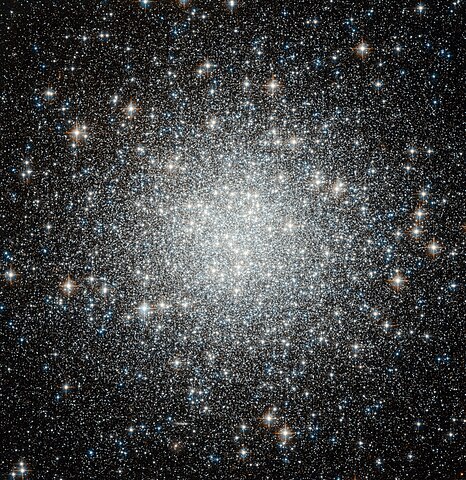Wikipedia:Featured picture candidates/The Stellar Swarm
Appearance
Voting period is over. Please don't add any new votes. Voting period ends on 13 Feb 2015 at 13:03:42 (UTC)
-
M80 (NGC 6093), one of the densest known globular star clusters in the Milky Way galaxy and aged about 12 billion years
-
Messier 56, which at 13 billion years is approximately three times the age of the Sun
-
NGC 2808 and its 3 generations of stars
-
Messier 53, captured with crystal clarity has surprised astronomers with its unusual number of a type of star called blue stragglers
-
At 13 billion years old Messier 5 is incredibly old, dating back to close to the beginning of the Universe, which is some 13.8 billion years of age, and also one of the biggest clusters known
-
Messier 10 is a ball of stars that lies about 15000 light-years from Earth, in the constellation of Ophiuchusand is approximately 80 light-years across, hence it should appear about two thirds the size of the Moon in the night sky (yet not possible due to extreme diffuse light)
-
NGC 411 is in fact not a globular cluster, and its stars are not old. It isn’t even in the Milky Way and hence it is classified as an open cluster
- Reason
- Though not complete (there are at least 150 of them), this is a fascinating set of globular clusters, each consisting of hundreds of thousands of stars bound together by their collective gravity. They all have their own EV in the article and each of them have their own story to tell.
- Articles in which this image appears
- Globular cluster (an FA)
- FP category for this image
- Wikipedia:Featured pictures/Space/Looking out
- Creator
- ESA/Hubble & NASA
- Support as nominator – - The Herald (here I am) 13:03, 3 February 2015 (UTC)
- Oppose - These all work better as individual noms. — Crisco 1492 (talk) 13:23, 3 February 2015 (UTC)
- So they don't deserve a set title Chris? -- - The Herald (here I am) 13:28, 3 February 2015 (UTC)
- You said it yourself: it's not complete. — Crisco 1492 (talk) 13:31, 3 February 2015 (UTC)
- I could count 466 images of them in Commons and not more than 10 or 15 of them are of FP quality. Plus the article is not under illustrated too. So is there any chance for more pics to be included here? Probably not. - The Herald (here I am) 13:47, 3 February 2015 (UTC)
- So they don't deserve a set title Chris? -- - The Herald (here I am) 13:28, 3 February 2015 (UTC)
- Oppose, I agree with Crisco. Why not nominate (say) File:A Swarm of Ancient Stars - GPN-2000-000930.jpg for its EV in Messier 80? I'm not saying I'd support that, but the nomination would make more sense than this one, which is effectively "here's a batch of images which happen to be used in an article and may have a chance of passing FPC". If I can offer a little advice, perhaps stay away from set nominations for a little while? J Milburn (talk) 17:47, 3 February 2015 (UTC)
- Oppose - have to agree with other opponents; can never be a complete set until there are FP quality images of all Messier objects. (What are those NGCs doing here? ;-) I don't agree with the "stay away" in the above, but a bit more thought behind noms will give a better average score... ;-) ;-) --Janke | Talk 21:38, 3 February 2015 (UTC)
- Comment Are there any clear definitions about sets? Hafspajen (talk) 01:38, 4 February 2015 (UTC)
- Maybe, maybe not, but IMO, just plucking together a bunch of pics (even though somewhat related) does not an EV set make... Gorgeous pics, nevertheless. --Janke | Talk 09:01, 4 February 2015 (UTC)
Not Promoted --Armbrust The Homunculus 13:36, 13 February 2015 (UTC)







